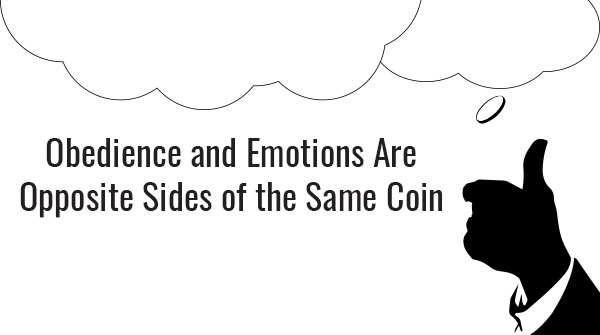Obedience is submission to another’s authority. The meaning of obedience is not to what but to whom you are obeying that matters. Biblically speaking, obedience is aligned with following God’s will, or seeking to know God’s will through God’s word and words, whether this is written or spoken as you hear from the Lord.
We must remember that we are embodied creatures, spirit, mind, and body. And while our bodies will fade away our spirit will live on. Therefore, we cannot talk about obedience without the emotions that lead to our inner self, our heart’s motivations. Because outside of the “12 rules of Scripture” we will be following principles that apply differently based on circumstance and heart motivations. Therefore, obedience and emotions are linked. Let’s explore this in more depth.
Psalm 1:1-6, “Blessed is the man who walks not in the counsel of the wicked, nor stands in the way of sinners, nor sits in the seat of scoffers; but his delight is in the law of the Lord, and on his law he meditates day and night. He is like a tree planted by streams of water that yields its fruit in its season, and its leaf does not wither: In all that he does, he prospers.”

Psalms Is About Our Soul, But Starts With Obedience
Psalms is a book that expresses our deepest soul longings and yet it begins with a prescriptive command for human flourishing. We want to be like a tree with deep roots in the word of God. This is how we can learn to be obedient in relationship with God.
Be Careful About What Guidance You Follow
This passage also communicates that whoever has your ear and eyes has your heart. It is very easy to sit in the seat of sinners, or scoff at others, or take counsel from wickedness. In our day, we have many avenues vying for our attention. Everywhere we look, our phones, readily available technology, there are systems and forces of authority that want our attention and have a preferred way of leading us into a certain way of behaving and acting. America’s media outlets and individual thought leaders will try to teach you how to be sad and how to have anger in the way they see fit. But we must continue to look to Jesus and to the voice of the Lord. The counsel and character of God guides and directs us, inviting us into His presence to submit our sorrows both big and small.
Obedience Starts With Meditation on God’s Word
The righteous man “mediates [on the word] day and night”. You won’t drift into righteousness, God invites us into that. But this requires our obedience to Him. Jesus is the only example of perfection of heart and mind, body, soul and Spirit. We can trust Him and look to Him.
Do Not Model Yourself After God, Be In His Presence By Looking to Who He Is And Let Him Change You
We so often try to model ourselves after Him. But so often, for me, if I start there, I am looking for a quick fix and it becomes behavioral modification. I don’t need more trying to fix my own problems. I need to be surrendered by enjoying God for who He is, not for what I can get out of Him. For this I say, turn your affections to who God is and don’t try to live like Jesus in and of itself – as your end destination. Come to God without an agenda and let Jesus change you as you look to know Him more intimately and more fully.
Greater Obedience Comes Through Emotional Awareness
Often times, we don’t know how to be obedient because we don’t have emotional awareness. We have many areas needing deep pruning into the crevices of our soul. We don’t know what’s going on in our own soul without reflection and submission. We need other likeminded people to point out areas of weakness and greater opportunity to submit in obedience. Often, if my wife tells me something I need to work on, I don’t listen but if it’s someone else I might. Because, unfortunately, I am less likely to listen to the person closest to me.
Our Heart Has Two Sides: Emotion and Obedience
Our heart has two sides to the same coin: emotions and obedience. Living in obedience is submitting our desires, wants, thoughts, ideas, fears, pride, shame, and guilt to God. Our feelings are deeply connected with how we understand God and they influence how we relate to the world.
The World War II Generation Taught Us How to Act
Our grandparents, the World War II generation, were part of the working class where physical labor was the primary method of work. This was the greatest generation. They understood their duty and were willing to sacrifice their lives to rid an evil system in the world. When I was a kid and my grandpa was much older and wiser, he was a man of few words. He rarely expressed any emotion at all. For that generation, it was looked down upon and not appropriate to share their emotions. It was viewed as weak.
Relieve Unwanted Emotion Through Expressing Physical Energy
An antidote to relieve unwanted emotion is to express physical energy. Work in my grandparents day was primarily through physical and manual labor in industrial shops or in agricultural settings. It’s almost as if, because they could work with their hands, they had a built in natural system for exerting energy and releasing emotions through hard work. To add to that, my grandpa never talked about his emotions and he spent most of his retired days gardening and working outside.
Relieving Emotions in the Age of Technology
In my day, when the majority of my work is on a computer, we don’t have a natural way to express emotion through physical energy, at least, it is a lot less. It is culturally approved of to vent our frustrations (when socially acceptable) through social media, while we more often than not numb our emotions face to face or avoid those who don’t look, act, or believe like us.
Numbing the Pain Of Extreme Emotions
Particularly, when I’m frustrated or angry, I often default to trying to numb the pain. For years I numbed pain in very unhealthy ways, now it is much less aggressive. My fixation of choice is going outside and doing manual labor because it calms my spirit down. It nourishes my soul. But it also suppresses emotions rather than addresses them or pointing them to God.
When I am in the midst of a stressful day at my computer-based work and I can’t do manual labor, I used to call my dad to vent. This was also a form of expressing energy, releasing frustration. This was the only way I knew how to cope with life and with work when it got stressful, for years. My dad was the only one who would just listen and let me vent. He mostly didn’t tell me what to do with my emotions. But when he did, I would try to dutifully comply. And I would again feel frustration and disappointment because I was dependent on the approval of others. I was not dependent on God. It was an endless cycle of depression and discontentment.
Someone Else Showing Me The Emotion and Obedience Link
Then one day I realized through biblical counseling that I was suppressing emotions and refusing to address them. Most of them were personal emotions that I felt silly sharing but they were nonetheless there. And I would only express them to select people who would not belittle my thoughts and further drive more shame, fear, and guilt into my soul. This is what codependency does when you are trying to be obedient to God but don’t have emotional awareness to identify where your identity and trust is being placed.
Obedience and Emotion are Linked to Your Feelings
So, when you feel sadness, anger, or extreme emotions, you must have a name for them. You must call them out, verbally call them out. And then you must direct them to God. You must resist the urge to submit them to an alternate source of guidance in a habitual sort of way. You must be pointed to God’s word to root out the waywardness in your soul. This is where obedience is its own reward.
Encounter Grace Upon Grace and a New Disposition of Peace
Digging in the ditches of your emotion and feelings brings up new levels of grace upon grace that you would never believe possible. This is where a life of overflow and where peace, joy, self-control, and identity become transformed. It’s the fear of not knowing and not believing that holds us back. And when we choose to fear instead of let go it’s the anxiety that keeps us in areas of comfort, suppressing a whole new well of grace that God wants to take into His control and bring more beauty and freedom into your life.
